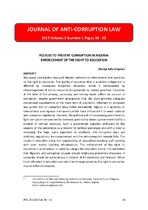| dc.contributor.author | Olayinka, Olaniyi Felix | |
| dc.date.accessioned | 2022-02-07T11:18:39Z | |
| dc.date.available | 2022-02-07T11:18:39Z | |
| dc.date.issued | 2019 | |
| dc.identifier.citation | Olayinka, O. (2019). Policies to prevent corruption in Nigeria: Enforcement of the right to education. Journal of Anti-Corruption Law, 3(1), 36-55. | en_US |
| dc.identifier.issn | 2521-5345 | |
| dc.identifier.uri | http://hdl.handle.net/10566/7185 | |
| dc.description.abstract | This paper investigates how well Nigeria conforms to international best practices
on the right to education. The quality of education that is available to Nigerians is
affected by inadequate budgetary allocation, which is compounded by
mismanagement of scarce resources and generally by corrupt practices. Education
at the level of the primary, secondary and tertiary levels suffers on account of
corruption, despite government propaganda that the state provides adequate
educational opportunities at the three tiers of education. Attempts to prosecute
and punish acts of corruption have failed consistently. Nigeria is a signatory to
international and regional instruments which have influenced it to enact national
anti-corruption legislation. | en_US |
| dc.language.iso | en | en_US |
| dc.publisher | University of Western Cape | en_US |
| dc.subject | Corruption | en_US |
| dc.subject | Nigeria | en_US |
| dc.subject | Right to education | en_US |
| dc.subject | Anti-corruption legislation | en_US |
| dc.subject | Politics | en_US |
| dc.title | Policies to prevent corruption in Nigeria: Enforcement of the right to education | en_US |
| dc.type | Article | en_US |

